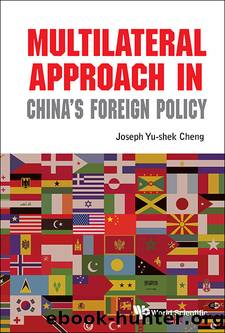Multilateral Approach in China's Foreign Policy by Joseph Yu Cheng

Author:Joseph Yu Cheng [Cheng, Joseph Yu]
Language: eng
Format: epub
Tags: International Relations, Public Policy, Political Science, World, Asian, General
ISBN: 9789813221123
Google: mYRIDwAAQBAJ
Goodreads: 37818995
Publisher: World Scientific
Published: 2017-12-21T00:00:00+00:00
Conclusion
When the ASEAN Regional Forum was being organized in 1993, the Chinese leadership was hesitant to become involved in multilateral regional organizations. China subsequently participated because it considered that it would be more advantageous to exercise its influence within these organizations than being excluded from them. By 2001, when the Shanghai Cooperation Organization was established, Chinaâs leadership was convinced that multilateral and regional organizations were important mechanisms for articulating its interests, enhancing its influence and promoting multipolarity. China has moved from a passive and defensive participant to an active organizer with a well-defined set of agenda items and strategies. Later, Chinese leaders considered that participation in subregional economic cooperation projects along its borders would be useful in its pursuit of the above objectives. It would further allow a relatively low profile while seeking leadership and reducing external pressures. This approach has been in line with the Chinese economic strategy of âgoing outâ to enhance economic security through investment to secure supplies of resources to support its economic growth and markets for its expanding exports. In the case of the less-developed ASEAN countries, there are the additional considerations of reducing Chinaâs aid commitments and accelerating the development of Chinaâs central and western provinces.
China has been successful to some extent in reducing its neighborsâ âChina threatâ perception. If its impressive economic growth remains sustainable, this process is expected to be enhanced. But its success has attracted considerable attention from the major powers involved in the Asia-Pacific region, and China anticipates keen competition. Like Chinaâs venture into Africa, its activities in Southeast Asia have been criticized in the West for neglecting democracy, good governance and human rights, as well as for its selfish exploitation of natural resources at the expense of environmental protection. Apparently, the Chinese authorities are aware of these shortcomings, and a more sophisticated strategy to improve Chinaâs image is being implemented.
At the provincial level, the major obstacles are coordination and resources. In the approach to the CLMV Group of countries, the Chinese provinces concerned are relatively poor. They have an uphill battle fighting for preferential policies and resources from the central government. Keen competition among them makes effective coordination even more difficult. But the situation is improving, given the favorable shift in priorities to their development on the part of the Chinese leadership, and the economic benefits are impressive despite a low starting point. Higher economic growth rates have moved from the coastal provinces in China to its central and western provinces; similarly, they have moved from the four little dragons of Asia to countries like Vietnam and Cambodia. The appreciation of an export-oriented growth strategy based on the attraction of foreign investment and the development of transport infrastructure is obvious.
Regarding ChinaâASEAN subregional economic cooperation, the learning curve in China has been steep at both the central and provincial levels, and Chinaâs engagement has been extensive and growing. Nationalist reactions to the escalation of the territorial disputes in the South China Sea and other sovereignty concerns â in the region
Download
This site does not store any files on its server. We only index and link to content provided by other sites. Please contact the content providers to delete copyright contents if any and email us, we'll remove relevant links or contents immediately.
Spell It Out by David Crystal(35864)
Life for Me Ain't Been No Crystal Stair by Susan Sheehan(35551)
Cecilia; Or, Memoirs of an Heiress — Volume 1 by Fanny Burney(32098)
Cecilia; Or, Memoirs of an Heiress — Volume 3 by Fanny Burney(31491)
Cecilia; Or, Memoirs of an Heiress — Volume 2 by Fanny Burney(31439)
The Great Music City by Andrea Baker(30938)
Professional Troublemaker by Luvvie Ajayi Jones(29449)
We're Going to Need More Wine by Gabrielle Union(18664)
Twilight of the Idols With the Antichrist and Ecce Homo by Friedrich Nietzsche(18326)
The Secret History by Donna Tartt(18276)
All the Missing Girls by Megan Miranda(14879)
Cat's cradle by Kurt Vonnegut(14811)
Pimp by Iceberg Slim(13830)
Bombshells: Glamour Girls of a Lifetime by Sullivan Steve(13720)
Fifty Shades Freed by E L James(12940)
Talking to Strangers by Malcolm Gladwell(12926)
Norse Mythology by Gaiman Neil(12887)
The Social Justice Warrior Handbook by Lisa De Pasquale(11970)
Underground: A Human History of the Worlds Beneath Our Feet by Will Hunt(11862)
